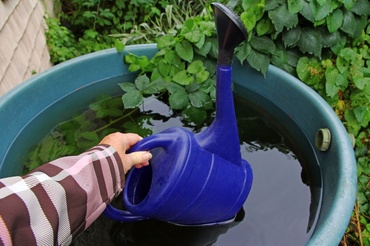
For many of us, gardening is a way to connect with the natural world, so we want to be sure that when we’re gardening, we’re not harming that world. To help, we’ve put together our top tips on how to garden more sustainably, make the best use of our natural resources and avoid waste.
How to save water in the garden
Water is one of our most precious resources, and it’s also vital to the health of our gardens. Here are a few ways to minimise water waste while still giving your plants what they need to grow.
- Install a water butt to collect rainwater and use this to water your plants whenever possible. As well as saving our precious water supplies, rainwater is often better for plants than tap water, especially in hard water areas.
- Put away your hosepipe and use a watering can to water your plants. This allows you to get every drop of water to where it needs to be, with minimal waste.
- Fix leaky hoses and dripping taps straight away.
- Water the garden in the morning or evening to reduce water loss through evaporation.
- Place a plant tray under your pots so that the roots can soak in the water from the bottom.
- Mulch your beds with a thick (5cm/2in) layer of garden compost or well-rotted farmyard manure in spring or autumn. This improves soil structure and helps lighter soils to retain moisture, meaning you need to water less often.

Make your own compost
Making your own compost not only benefits your soil, it also helps reduce carbon emissions from transporting garden waste. If you don’t have space for a big compost heap, get a green waste bin from your local council and start composting!
- Aim for a 50/50 mix of soft green waste (like grass cuttings, stems and leaves) and brown waste (like shredded woody stems and cardboard).
- Don’t compost perennial weeds like bindweed or brambles in a home compost heap or bin, as the temperature doesn’t get high enough to kill them off, and you could end up just spreading them back onto your garden!
- Pile up autumn leaves separately to make leaf mould, one of the best soil conditioners there is.

Re-use and recycle plastic
Disposing of plastic pots and old compost bags has long been a problem for gardeners, but thankfully, solutions are now available!
- Many of the larger supermarkets have recycling collection points for plastic bags, so wash out those old bags and find your local collection point.
- Garden centres often offer collection points for old plastic plant pots. Unfortunately, black plastic pots can’t yet be recycled, so try to choose coloured pots when buying plants.
- Wash out your old plastic pots and use them for potting on seedlings.
- Re-use old compost bags as grow bags for vegetables such as tomatoes or peppers.
From peat-free compost to organic vegetable seeds, you’ll find everything you need for your garden in our centre. Come in and see what’s in store!

